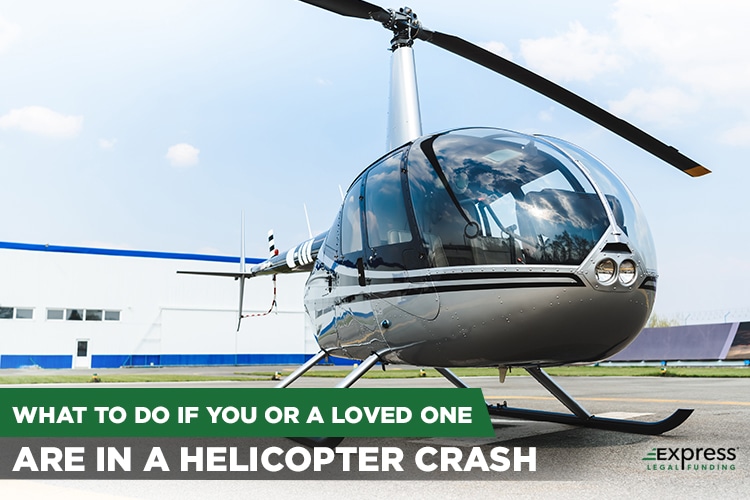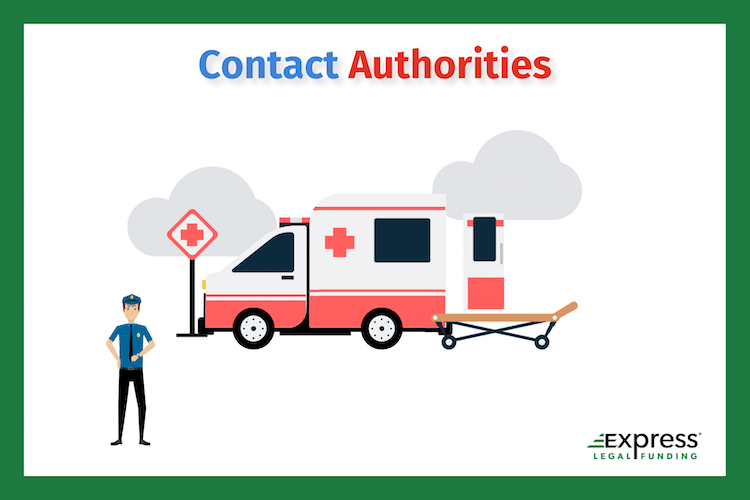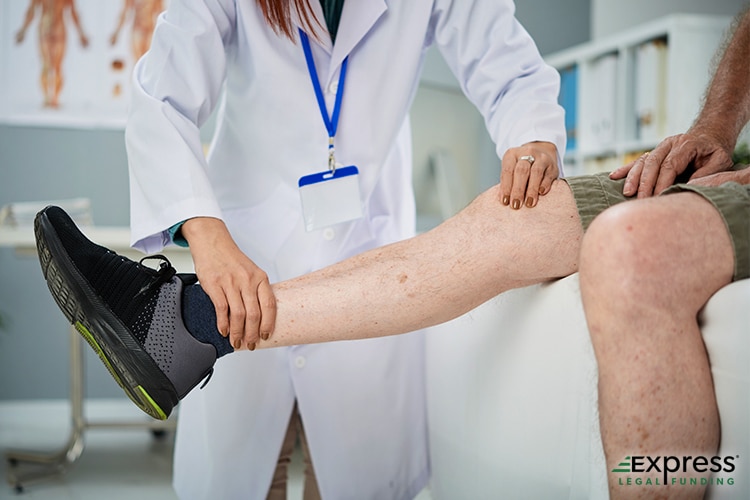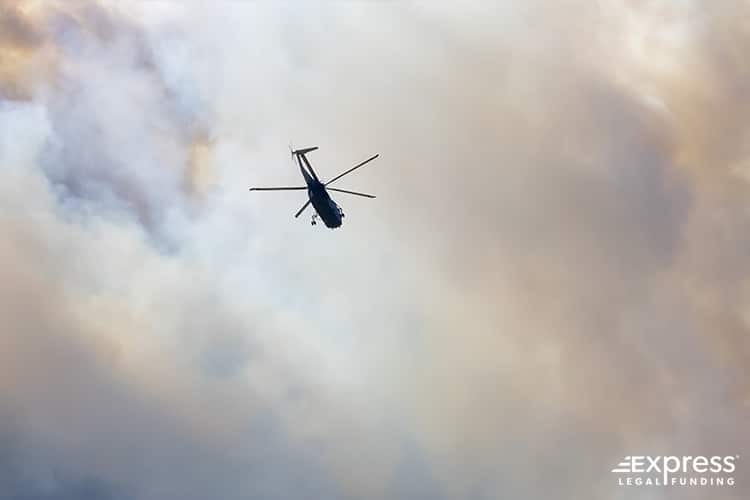Written by Aaron R. Winston
Last Updated: November 17, 2023 3:53am CST

Getting into an accident can be devastating, but most vehicle-based collisions are survivable. Car accidents are remarkably common these days, but it is rare for them to be fatal, thanks to modern safety features.
As a result, getting into a car accident is not as life-threatening as it once was, though it is still something to take precautions to avoid whenever possible.
The problem is when it comes to transportation safety at large.
We have more options than ever before available to us, so cars and motorcycles (statistically more dangerous) are no longer the only form of private transportation available to us and are not the only point of concern in the transportation industry.
One of the main advancements in transportation is the rise of the air travel industry, which has allowed us to more quickly traverse large distances in planes and helicopters, with the latter being the focus of this article.
How fast do helicopters fly? Many of the most popular civilian helicopters can travel at speeds over 175 mph while avoiding the slowdowns that cars on the roads below are subject to.
Aircraft are popular forms of transport, with copters best suited to traverse short distances due to being smaller and having a less sturdy hull.
Helicopter tours and rescue choppers are familiar sights in our skies and represent the majority of helicopter air traffic outside of war zones and armed conflicts.

Despite being radically different from airplanes, helicopters are susceptible to similar system failures that force emergency landings.
The prospect of getting into a car crash is frightening but straightforward since you and your car are used to driving “safely on the ground.”
However, the mere thought of being in an aviation accident, specifically a helicopter crash, makes for an entirely new level of terrifying.
The basic concept of a helicopter accident essentially involves falling out of the sky and crashing hard into the ground below.
All the while, we must hope that the impact of the landing is not rough enough to cause lethal injuries or, worse, not live to see the story on the news.
While surviving the dangers of a helicopter crash is common, it can cause severe damage and trauma, which, alongside what steps to take if you or a loved one find yourself as a victim of one, is the focus of this article.
So, we’ll start with the facts surrounding the crash fatality stats.
What To Do After a Helicopter Crash?
After the crash, it should be no surprise that you are likely to struggle with figuring out what to do next since the accident almost certainly left you disoriented.
Therefore, you might want guidance on what to do if you or a loved one are involved in a helicopter crash, what the likelihood of surviving is, and whether you should brace yourself for the worst from a probability stats perspective.
Step #1 – Know the Statistics About Helicopter Crashes
Twenty-five million adults in the United States have a fear of flying in general, which not only includes airplanes but also helicopters, among other types of aircraft.
So, if you or someone you know is fearful of dying in a helicopter crash and want to know whether that worry is rational or not, the following statistics are for you.

So, let’s begin by discussing the odds of someone dying in a helicopter crash.
What Are the Odds of Dying In a Helicopter Crash?
According to statistic reports released by the National Transportation Safety Board (NTSB) and the Federal Aviation Administration (FAA) Safety Team, your chances of dying in a helicopter accident are remarkably low, as there is less than one fatal helicopter crash per 100,000 hours of fly time.
That equates to a 0.0076% chance of dying in a helicopter accident (assuming you fly in one).

Still, that statistic does not tell the whole story about the fatality rates of helicopters. To get a complete understanding of your odds of dying in a helicopter crash, let’s adjust the question to the following:
What Percentage of Helicopter Crashes Are Fatal?
Most helicopter crashes are not fatal, as only about 20% of helicopter accidents result in death. The inverse to that stat provides us with the answer to the following:
What Is the Helicopter Crash Survival Rate?
The overall helicopter crash survival rate is 80%. Considering that helicopters have limited gliding capabilities and more or less can fall out of the sky when their engines cease working, a 4/5 crash survival rate is relatively good.
To further put it in perspective, you have a 5% higher chance of surviving a motorcycle crash than a helicopter accident.
It is essential to keep in mind that the above are combined crash statistics that do not factor in the circumstances surrounding a helicopter accident, as some situations increase the likelihood of your experiencing or dying in a helicopter crash.
For instance, thick cloud cover and a pilot breaking protocol are factors that increase the likelihood of a crash, which was the case with the fatal crash that killed professional basketball star Kobe Bryant, his 13-year-old daughter Gianna, and seven other passengers on January 26, 2020.
The fact is that most helicopter accidents do not result in fatalities, which made the news story of Kobe and Gianna’s crash and ensuing death all the more startling and why it continues to captivate the public.
Keeping this in mind can help you stay calm during the crash event itself or while rushing to visit a loved one who you just received word was in an accident.
Important: In the unfortunate event of you or your family suffering an injury or death, seeking legal advice is crucial, as accidents bring financial implications that can impact you and your loved one’s quality of life.
Personal injury attorneys specialize and offer free consultations for people in these situations, especially in wrongful death cases.
Step #2 – Seek Medical Attention (Call 911)
Being in a helicopter crash or any sort of aviation accident, whether in densely populated terrains like southeast Florida or remote locations like upstate Alaska, will result in injuries ranging from moderate to severe.

The crash site and other circumstances surrounding the crash will affect how dangerous it is and the types of injuries you can sustain.
These factors further necessitate you contact the police and emergency response services by dialing 911 on your cell phone if possible, as they can help rescue you and provide you with medical attention while still at the scene.
For instance, high speeds and mid-air collisions are common causes that lead to more significant damage.
Extreme circumstances, such as interference from power lines or rushing water, can lead to fatal injuries, but most crashes are the type you can walk away from.
Some people, especially crew members equipped with seat belts and emergency exits, are more likely to walk away from helicopter crashes with seemingly no injuries and assume they are okay without further investigation.
You May Not Realize the Extent of Your Injuries
In reality, people often do not register their injuries because crashes cause adrenaline rushes that dull pain, which is the purpose of the flight or fight hormone.
The lack of pain and burst of increased strength helps us to get to safety and ultimately survive harrowing crash situations.
This same concept applies to soldiers in the army or navy experiencing the real-time stress of combat.

Danger of Internal Injuries
Although typically external, some types of injuries resulting from a helicopter crash can manifest only internally and not have outward signs beyond general pain or sensitivity.
Unfortunately, the benefit of an adrenaline surge caused by the crash can work against the victims in the long run, as they may be unaware of severe and life-threatening internal injuries, which can be almost impossible to detect on their own until it wears off.
This dynamic is especially common for cases involving internal bleeding, which is why it is crucial not to skip the step of seeking medical attention following a helicopter accident.
The primary step after any accident is to seek immediate medical attention, even if you were lucky enough to sustain minor injuries.
In places like deep in the bayou of Louisiana or Australia’s outback, quick accessibility to medical facilities can be hard to come by, yet it can make all the difference on whether you survive a helicopter crash or not.
Burns and Cuts Pose Risk of Infection
Some injuries, such as severe burns, can result in serious health issues worse than the initial assessment suggests and require a more in-depth analysis to treat.
For instance, second-degree burned skin is prone to becoming infected, which may require a doctor to prescribe antibiotics to prevent the spread of infection.
Diagnostic Imaging For Internal Injuries
Only medical professionals in proper healthcare facilities can perform the analysis required to determine whether the injuries you sustained are more severe than you initially believed.
Often, this may involve emergency room doctors having their patients undergo imaging such as a CT scan. Without proper testing available, doctors are forced to fly blind when it comes to diagnosing crash victim injuries.
Not having the ability to run all the necessary tests, doctors are more likely to make mistakes by either misdiagnosing or missing the presence of injuries outright.
Healthcare professionals don’t take this lightly, as they know it can lead to lethal consequences.
For instance, if a doctor at an urgent care clinic determines that an injured patient under their care needs an MRI, which their facility does not have, they will likely have them transported to an emergency room that does, which, depending on the remoteness of the location, it can take several hours to finally get to the MRI machine.
What Are the Most Common Types of Helicopter Crash Injuries?
Some of the more common helicopter injuries that are not visible to the naked eye include the following:
Internal Helicopter Accident Injuries
- Traumatic brain injuries (TBI)
- Spinal cord injuries
- Internal bleeding
- Broken ribs
- Nerve damage
Some of the most common helicopter crash injuries that are not difficult to detect and you are less likely to overlook are the following:
External Helicopter Crash Injuries
- Compound fractures
- Lacerations
- Burns
- Lost teeth
Ultimately, in addition to the above list, there are numerous types of noticeable injuries that can be caused by being in a helicopter accident, which include the same types of physical damage one can expect to sustain from a fixed-wing aircraft crash.

The fact is that medical attention is essential for anyone involved in a helicopter crash to ensure no severe injuries are overlooked, which, if left untreated, would result in death.
With that being said, the unfortunate reality is that rarely will a helicopter crash victim’s healing be over once they get seen by an emergency room doctor.
Depending on the type of helicopter injury, the risk of future complications can be expected, which is why emergency room doctors often instruct patients in their care to seek a follow-up appointment with a specialist.
Not only do neck and back spine injuries caused by helicopter crash impacts have a higher chance of fatalities due to damage caused to our vertebral column on impact.
They are also commonly associated with chronic pain and long healing times, which can be expensive to manage.
You got discharged from the hospital and got to go home. Now what?
Step #3 – Follow Up With Specialists
Once you have received your initial medical assessment, the doctors who checked your injuries will likely refer you to specialists, such as an orthopedic surgeon, if you have broken bones that may require an operation to repair.
Specialists have undergone extra training and have more expertise in their fields, which enables them to treat you for specific injuries for specific body parts that might not respond to generalized treatment.
Although unlikely, some people might only need to have a few chiropractic adjustments or physical therapy visits to heal, whereas others who suffer severe injuries may need to be put in the care of a surgeon and pain management doctors.
In general, regardless of the type of provider, the healthcare referral system ensures patients can more swiftly get the optimum care they need and avoid unnecessary doctor’s appointments.
All the more so is this process applicable to survivors of helicopter accidents since the crashes come with a high likelihood of serious injuries. All of which will require extensive treatment and the oversight of one or more specialist doctors.
Unfortunately, even though the referral system can speed up the recovery process, it is not automated, as it falls to the individual patient to follow up with the referrals and get the treatment they need.
Schedule and Attend Follow Up Appointments
If an ER doctor or your general practitioner says you need additional treatment from a specialist, it falls on you to schedule the appointment. (Though some referrals involve the provider calling you to confirm the appointment.
Failing to follow up means you might not receive the vital treatment you need to heal from the injuries you sustained in the accident.

Skipping Specialists Will Likely Your Worsen Injuries
Not getting seen by a specialist when a doctor refers you to one increases the likelihood that your injuries will worsen and you will not receive proper treatment, which could result in lifelong complications or even preventable death.
Furthermore, failing to seek treatment promptly can have specific legal ramifications if the circumstances and resulting injuries demand filing a lawsuit.
Following up on medical appointments is not only crucial to your body’s recovery but also allows you to generate a critical list of medical providers that you saw for your injuries.
That last factor might seem unimportant and overall moot since you may think, who really cares about the different doctors you are seeing or how many of them they are?
Medical Records Act As Evidence In Lawsuits
In reality, these records (especially the doctor’s notes) might also be vital evidence for your “financial” recovery, regardless of whether the helicopter that crashed was commercial or a private pilot you contracted for a flight.
Ultimately, when you are in a helicopter crash, as is in the above scenarios, you will almost always have cause to seek legal action against the pilot or the agency they work for (by filing a personal injury lawsuit).
Step #4 – Determine the Cause of the Crash
Like other aircraft types, helicopters can crash for one of several reasons or even because of several issues affecting it simultaneously. Some of these are spontaneous issues that might occur due to mechanical failure or unforeseen anomalies mid-flight.
For example, a sudden shift in weather might put the helicopter in the middle of an intense storm. That can force a crash landing since helicopters cannot handle extreme weather. What are the most common causes of helicopter accidents?
Most Common Causes of Helicopter Crashes
- Pilot error
- Weather
- Engine failure
- Poor maintenance
- Manufacturer defects
- Air traffic control errors
Environment Factors: Weather
While sudden weather shifts or spontaneous damage caused by environmental factors cannot always be avoided, there are situations where the helicopter’s owner or their employees are the cause of the crash.
Although helicopters may differ in functionality compared to cars, trucks, and airplanes, they share one universal quality that cannot be overlooked.
Malfunctioning Parts and Negligence of Maintenance Personnel
Helicopters require consistent maintenance to ensure the components remain functional and do not break mid-flight.
Over time, the components that keep the bladed aircraft functional wear out from use and become more susceptible to breaking when subjected to further use.

Typically, overused components are detected through routine maintenance, allowing the maintenance staff to replace any parts on the verge of breaking.
In extreme cases, they might be unable to use the helicopter if the damage is extensive enough. Either way, this maintenance is essential to ensuring passengers are not endangered by faulty hardware.
Unfortunately, the engineers responsible for performing this maintenance sometimes neglect their responsibilities, leaving faulty equipment in the aircraft.
That means some crashes are caused by mechanical failure because they were improperly maintained and repaired per regulations.
Helicopter Pilot Error
Unfortunately, issues with the helicopter are not always the reason for a crash since even the most pristine machine must be operated by a pilot and observer (co-pilot).
Pilots must be trained within specific standards to ensure they can operate an aircraft safely, especially those that carry passengers.
Unfortunately, human error is just as common as mechanical error since we are susceptible to exhaustion, ignorance, or forgetfulness.
Worse still, we are vulnerable to certain substances like alcohol that impair motor function and judgment.
Therefore, a pilot whose faculties are compromised or forgot to perform part of their duties is just as dangerous as a faulty helicopter.
Pilot error and negligence can cause a crash if the pilot has lost control of their faculties or is careless while operating the aircraft.
While co-pilots accompany helicopter pilots to minimize the risk, it is not a perfect fail-safe. It is possible and far from unheard of for one pilot’s carelessness to cause a crash, even with the precaution of flying with a co-pilot sitting.
Step #5: File a Legal Claim (If Applicable)
Like plane crashes, helicopter crashes are also thoroughly investigated by the FAA and NTSB so it will be discovered if a hardware issue or pilot error caused the accident.
While specific issues like sudden weather shifts cannot be accounted for, failure to properly maintain or operate the helicopter is a grievous oversight.
As mentioned, at the very least, you can expect the crash to leave you injured and force you to seek medical attention, which is expensive, no matter your location.
The subsequent medical bills have become an almost crippling financial factor in the United States today since they usually reach tens of thousands of dollars when surgery is involved.
That means a crash caused by someone else’s negligence can be financially devastating and leave you to pay it off.
These expenses can be almost impossible to cover without a windfall you can dedicate to your medical bills. Unfortunately, quickly getting that much money is next to impossible unless you benefit from wealthy friends or family.
Your Legal Option of Filing a Civil Lawsuit
While this might be devastating news, there is one essential legal option you have, which is a major part of the United States legal system: civil lawsuits.

Transportation of all kinds, whether they fall under commercial, private, or government authority, must be maintained for safety. Not doing so, would be failing to uphold their legal duty of care.
Additionally, the operators of those vehicles must adhere to guidelines to ensure they do not put the vehicles and the passengers at risk.
Can You Sue For a Helicopter Crash?
Yes, you can sue by filing a civil lawsuit to financially recover from and be compensated for the helicopter crash injuries you suffered due to someone else’s intentional or negligent actions.
If a private or chartered helicopter crashes due to poor maintenance or pilot error, the helicopter’s owner is liable for the incident and can be sued for injuries and damages. Most often, these claims result in a monetary settlement being agreed upon and paid out by the liable party to the plaintiff.
Personal Injury Lawsuits For Financial Recovery
As a result, the victims are permitted to file a personal injury claim against the owner (be it an individual or organization).
Such claims empower private citizens to recover financial compensation from the negligent party that caused their injuries and subsequent medical expenses.
Although less necessary than in car accident cases due to strict liability laws, the biggest challenge is proving that the crash was caused by negligence rather than something outside the pilot’s control.
You would need to prove this to be awarded a larger settlement that factors in gross negligence damages.
Most commercial carriers insure the passengers to compensate them in worst-case scenarios, but you might need to launch a formal investigation to determine what caused the crash and prove that it was their responsibility.
Unfortunately, the settlement offered by personal injury claims takes time to finalize, and the cost of living and any associated legal fees can compound the already stifling medical expenses.
Closing Statements On Helicopter Crashes
Involvement in a helicopter crash can be terrifying since the initial shock can cause you to fear for your life or that of your loved one.
Fortunately, surviving is seldom the issue, and you must instead worry about the medical treatment you will need after.
Following these steps will help you recover from the crash, but the costs of treatment and out-of-pocket prescriptions add more stress. Definitely not less.
Many people struggle to make ends meet without such accidents, so supporting the financial costs of recovery can be difficult without aid.
We understand the challenges that come with recovering financially after a helicopter accident.
Pre-settlement Funding For Helicopter Crash Lawsuits
That reality is why we, as an industry, can provide plaintiffs with a unique financial product known as pre-settlement funding while their claim is pending in court.
The medical expenses and lost income can make it incredibly difficult to keep up with your existing bills and payments. On top of that, you may need to make new purchases as you navigate through the legal system.
What sets us apart is our lawsuit funding option. Unlike traditional credit-based industries, we offer non-recourse pre-settlement funding that is not a loan.
This is why the term “lawsuit loan” is often misused (in some states, the financing is indeed a loan between a lender and borrower).

As a leading legal funding company, we can provide you with funds based on the potential outcome of your case, specifically a settlement.
It’s a buyer/seller contract where we purchase a stake in your claim’s potential proceeds, which means we only receive payment when you successfully settle or win your lawsuit.
On the other hand, if you and your attorney decide to prosecute your suit in court but unfortunately do not achieve financial recovery, you are not obligated to repay us.
This is because our funding is contingent upon the success of your case and is what makes it non-recourse.
At Express Legal Funding, we are a company committed to providing support and assistance during this challenging time. We aim to alleviate your financial burden and help you focus on healing from your accident’s injuries.
Our funding intake team is literally available around the clock to answer your calls and assist you with your application on your path to getting approved.
Remember, our lawsuit funding is non-recourse and not a loan. It’s a way for you to access the funds you need now and get immediate cash in hand while your case progresses.
We make it fast and easy, and that begins with making sure you can call us anytime, 24/7, or apply online to help you move in the financial direction you deserve with pre-settlement funding.
About the Author
Aaron Winston is the Strategy Director of Express Legal Funding. As "The Legal Funding Expert," Aaron has more than ten years of experience in the consumer finance industry. Most of which was as a consultant to a top financial advisory firm, managing 400+ million USD in client wealth. He is recognized as an expert author and researcher across multiple SEO industries.
Aaron Winston earned his title "The Legal Funding Expert" through authoritative articles and blog posts about legal funding. He specializes in expert content writing for pre-settlement funding and law firm blogs.
Each month, tens of thousands of web visitors read his articles and posts. Aaron's thoroughly researched guides are among the most-read lawsuit funding articles over the past year.
As Strategy Director of Express Legal Funding, Aaron has devoted thousands of hours to advocating for the consumer. His "it factor" is that he is a tireless and inventive thought leader who has made great strides by conveying his legal knowledge and diverse expertise to the public. More clients and lawyers understand the facts about pre-settlement funding because of Aaron's legal and financial service SEO mastery.
Aaron Winston is the author of A Word For The Wise. A Warning For The Stupid. Canons of Conduct, which is a book in poetry format. It consists of 35 unique canons. The book was published in 2023.
He keeps an academic approach to business that improves the consumer's well-being. In early 2022, Aaron gained the Search Engine Optimization and the Google Ads LinkedIn skills assessment badges. He placed in the top 5% of those who took the SEO skills test assessment.
Aaron's company slogans and lawsuit funding company name are registered trademarks of the United States Patent and Trademark Office. He has gained positive notoriety via interviews and case studies, which are a byproduct of his successes. Aaron R. Winston was featured in a smith.ai interview (2021) and a company growth case study (2022).
In 2023, Aaron and Express Legal Funding received accolades in a leading SEO author case study performed by the leading professionals at WordLift. The in-depth data presented in the pre-settlement funding SEO case study demonstrate why Aaron Winston maintains a high-author E-E-A-T. His original writing and helpful content continue to achieve unprecedented success and stand in their own class.
Aaron was born in Lubbock, TX, where he spent the first eight years of his life. Aaron attended Akiba Academy of Dallas, TX.






